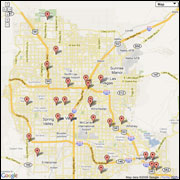Monday, Aug. 16, 2010 | 2 a.m.
Sun Archives
- Advocacy group says it’s OK for casinos to market to gambling addicts (7-21-2010)
- Help for gambling addicts is salvaged in final state budget (3-6-2010)
- Slashing of problem gambling earmark is more costly in long run, state is warned (2-23-2010)
- LV companies in denial about problem gambling (11-20-2009)
Sun Coverage
Local Gamblers Anonymous Meetings
See a map to find out about Gamblers Anonymous meetings in the Las Vegas Valley.
It’s been a tough year for the Problem Gambling Center, which is operating on 70 percent of its normal budget after state cutbacks and a recession-fueled decline in donations.
That, plus hundreds more people are seeking help at the gambling addiction treatment center.
But that’s not the only worry for the largest public, nonprofit walk-in center for compulsive gamblers in Nevada.
As the community slogs through its second and third stages of decline in the Great Recession, the Sahara Avenue office is witnessing an increasing number of elderly people — among the most vulnerable citizens — seeking help for gambling problems.
This year, 43 percent of the people seeking help have been over 51 years old. Historically, walk-ins over 50 represented closer to 30 percent, although that percentage has grown in recent years, Executive Director Krista Creelman said.
Last year, about 150 people completed the center’s intensive outpatient program, and about 1,000 were helped by the center’s staff through methods such as group counseling, family therapy and basic financial planning.
With more than four months left in 2010, the center is approaching last year’s numbers, Creelman said.
Many older people have depleted their retirement savings by the time they reach the center, she said. Bankruptcies and lost homes, always part of the impoverished landscape of gambling addiction, are common stories rather than occasional, worst-case scenarios for compulsive gamblers.
“We continue to hear from them that their retirement savings are gone and that Social Security isn’t enough to get them by,” Creelman said.
The increase doesn’t necessarily indicate that more elderly people are gambling. Nor does it reliably point to a trend among the gambling public or in the local economy, as many compulsive gamblers don’t seek help, while those who do have hit rock-bottom.
The increase might reflect the center’s 3-year-old senior outreach program, which includes presentations and one-on-one help at senior centers and in-home therapy sessions. The center arranges for disabled people to be picked up and driven to the center in handicapped-accessible buses.
Treatment experts are focused on individual problems rather than larger economic truths.
The influx of elderly, cash-poor residents yields some reasonable conclusions in today’s economy, Creelman said.
“I think people are hitting bottom quicker,” she said. “People don’t have the finances like they used to so they’re coming in for treatment more quickly.”
Most of the center’s $400,000 budget comes from donations from casinos and slot machine manufacturers, among the hardest-hit companies in the recession. Several cut donations “not because they don’t want to help us anymore but because they just don’t have the money,” said psychologist Robert Hunter, who runs the center’s treatment programs.
The center faces bigger problems next year when its two-year funding commitment from the state ends, and it must appeal to lawmakers for more money — a seemingly impossible task amid a growing budget crisis.
In the meantime, a surprise $50,000 check last week from the Association of Gaming Equipment Manufacturers will help the center maintain its senior outreach program over the next few months.
It’s a shoestring existence that in some ways reflects the desperate, paycheck-to-paycheck reality of the center’s patients.


Join the Discussion:
Check this out for a full explanation of our conversion to the LiveFyre commenting system and instructions on how to sign up for an account.
Full comments policy